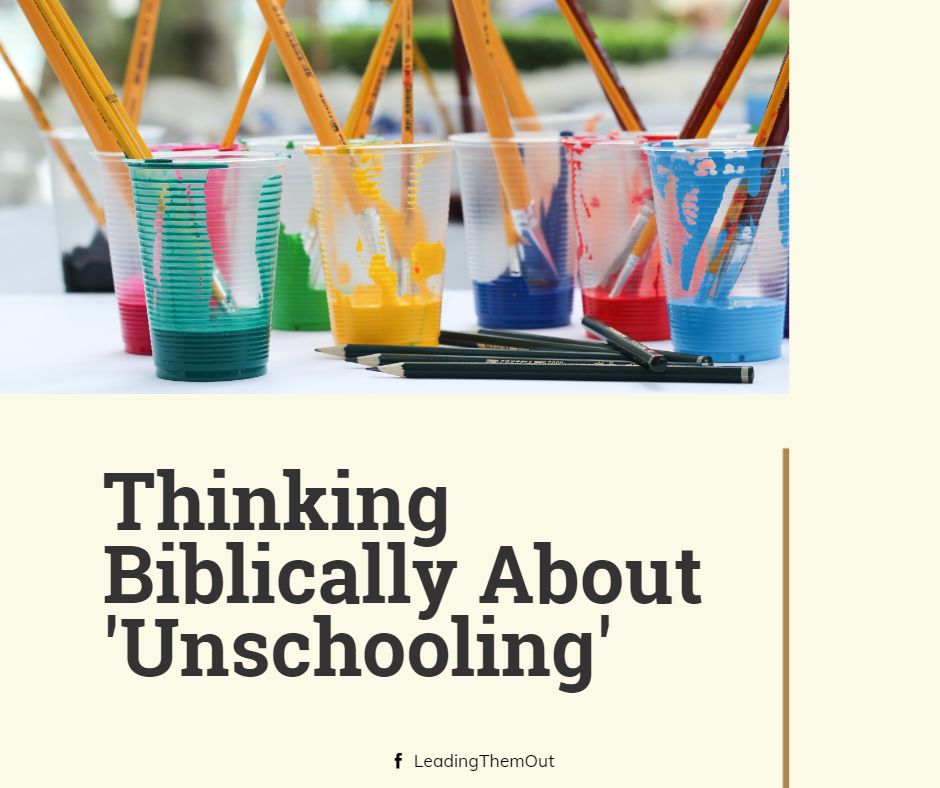Just because an idea takes the label ‘home education’ does not always mean that it is good.
Christian home educators need to be careful to use discernment when we think about our educational philosophy and the idea of unschooling calls for wisdom and thought.
One of the problems with unschooling is that it is extremely difficult to define it concisely. Generally, unschoolers would say that learning is ‘child-centered’ or ‘child-led’. There tends to be an aversion towards discipline and reward due to the belief that motivation should be intrinsic rather than extrinsic.
Since it is difficult to critique an educational philosophy where the definition is a moving target, the best approach is to hold onto Scripture and to shine the light of God’s word onto anything we read or hear about it. Perhaps it would be important to consider unschooling in the light of these verses:
1. ‘And Jesus increased in wisdom and stature…’ (Luke 2:52)
Children lack wisdom – even Jesus (in his humanity) had to grow in wisdom. I sometimes wonder whether unschoolers are placing too much responsibility on the shoulders of the child in allowing them to work out their own education. Children do not have enough understanding to make wise and critical decisions about their own lives. It is our job as parents to decide (thoughtfully) for them on matters of significant importance.
Please hear me, I think it is extremely important to encourage and allow for our child’s interests. Just because sections of the day are structured does not mean that there is not ample time for my children to pursue their own hobbies. However, this does not mean that our young children ought to be allowed to concentrate fully on one hobby or area of learning at the expense of everything else for an extended period of time.
An eight-year-old will probably have little understanding as to why Maths or Spelling might be important nor how they fit into her own learning delights. In the same way, an eight-year-old may not understand why she cannot eat chocolate with every meal! As parents, we have a responsibility to prepare our children for the future which includes teaching a range of subjects and even overruling some of their wishes if they are not wise.
2. ‘…a child left to himself brings shame to his mother.’ (Proverbs 29:15)
The idea that a child will always be self-motivated is a sweet thought. Unfortunately, it is not realistic. Even as an adult, there are days when I am excited by the work God has called me to do and I jump out of bed. There are also other days when I accomplish the work set before me not because I want to, but because I have disciplined myself to do so.
Children need to be taught hard work, self-motivation, respect and any other number of character qualities. To believe that children can learn these things without being taught is it abdicate our role as parents. How do we teach these things? We teach through example, but we also use the means that God has given us: namely through discipline and reward.
God is sovereign and will have his way regardless of whether or not we are obedient to use his means. Nevertheless, as a general principal, when we refuse to pay regard to his ordained way, we will not know the joy of a good outcome.
3. ‘Christ, in whom are hidden all the treasures of wisdom and knowledge.’ (Colossians 2:3)
Is unschooling ‘child-centred’ or ‘Christ-centred’? If the unschooler talks about a ‘child-centred’ or even a ‘child-led’ education, then this should raise a warning flag to believers in Christ. Surely all that we do must be done to the glory of God, acknowledging his rightful seat on the throne.
Consider what messages are being taught if a child find herself at the centre of the educational process: if the child is at the centre, then where is Christ seated?
4. ‘Train up a child in the way he should go; even when he is old he will not depart from it.’ (Proverbs 22:6)
Notice the use of the active verb ‘train’. To train somebody implies an action on the part of the one doing the training. We are not passive facilitators of our child’s education. We do not allow them to make all the forward moves and run behind them as if to catch up. We actively plan a path, consider what methods of training we will use and then put this into action!
And finally
To question the principles behind the unschooling philosophy does not mean that we are stone-hearted, immovable and unfeeling parents and educators. We do not move our children along a conveyor belt of enforced learning, regardless of individual strengths and weaknesses. The difference is that the parent acts with wisdom. We intentionally train and teach our children in the knowledge that their sin-filled natures find their root in us and that we are bound to do something about it. We seek to know and understand our children so that with wisdom we teach responsively and thoughtfully.
To the Christian home educators. We do not need to look to the world for instructions as to how we should raise and teach our children when we can look to all the treasures and the riches of the Word of God.

